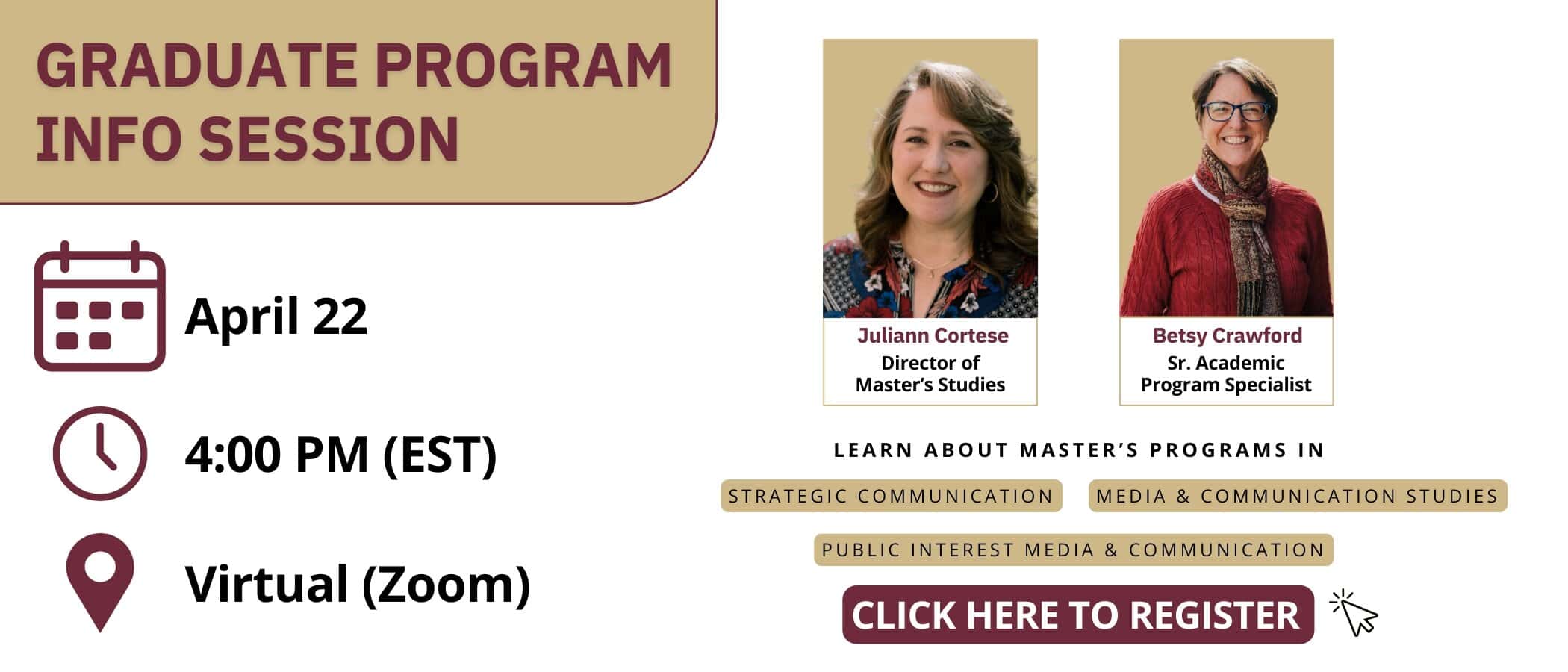Program Information
College: Communication & Information
Degree:
Limited Access: Yes
Contact: Natashia Hinson-Turner, Graduate Coordinator
Address:
School of Communication
Suite 3100, University Center C, FSU
P.O. Box 3062664
Tallahassee, FL USA 32306-2664
Phone: (850)-644-5034
Email: ComGradAdvising@cci.fsu.edu
Socially Responsible Media – Socially Relevant Research
The Public Interest Communication Master’s combines the best skills of an MFA in Film Production with the research skills of a traditional Master’s program, preparing students to create AND evaluate the media that is going to change the world.
The Public Interest Media and Communication Master’s program combines the best of an MFA in Video Production with the best elements of a traditional research Master’s in Media and Communication Studies. This program prepares students to create visual messages AND evaluate their impacts. PIMC is grounded in science-based, strategic communication designed to train effective communicators working to create positive change on a broad range of social, political, and environmental issues.
PIMC students learn foundational skills in 4K video production, built from the bottom up with no previous film or video experience necessary. Focusing on documentary, advocacy, and reality based visual storytelling, students learn to produce compelling moving images designed to address a range of social issues. Classes in research methods, social media campaigns, persuasion, and media theory teach students how to target specific audiences and how to evaluate the effectiveness of their visual messages, complementing their video production skills.
PIMC students find work in non-governmental organizations such as environmental, human rights and other social service groups as well as governmental agencies addressing issues such as public health, education and youth services, hunger and nutrition, environmental protection, and other social needs. This program recognizes the need for skilled communicators who can harness the power of visual communication in an effort to change the world into a more humane, sustainable place.
Related News
SCOM Alumna Whitney Lee Named Scarlett Magazine’s Woman of the Year for the Fourth...

READ MORE
SCOM Alumna Recognized as Seminole 100 Honoree

READ MORE
FSU SCOM Alumna Jessie Watson Receives MAC Award Celebrating the FSU Credit Union’s Rebrand...

READ MORE
Program's Overview
The Master’s in Public Interest Media and Communication is a hybrid (36 credit hour) professional/research degree that prepares students to work in the communication areas of non-governmental organizations, political campaigns, government agencies, and social service groups. The program also may serve as preparation for doctoral work in communication, leading to a teaching or research position.
Educational Goals
In this Master’s program, students will be introduced to practical digital media production skills, as well as theory and research methods. The program prepares students to:
- Create effective digital media/video
- Harness the power of social media distribution networks
- Analyze data to determine how messages are being received and acted upon
- Use communication theory to guide media creation and evaluation
Outcomes
By the conclusion of this master’s program, students will have knowledge and experience in:
- Creating digital video media content
- Evaluating audience reception of media campaigns
- Applying communication theory in the development of media campaigns
- Tailoring media messages to specific audiences and responding to audience feedback
The Public Interest Media and Communication Master’s program offers a capstone experience that enables students to:
- Explore a research area of interest in a thesis
- Produce a creative project
- Applying communication theory in the development of media campaigns
- Complete additional coursework
| Program Completion Options (Choose one) | ||||
| Creative Project or Thesis | Course-Only | |||
| Technology | 9 | 9 | ||
| Research Methods | 6 | 6 | ||
| Theoretical Foundation | 6 | 6 | ||
| Specialized Content Area | 6 | 6 | ||
| Residency or Additional Course | 3 | 3 | ||
| Capstone Project | 6 | 6 (2 additional courses) | ||
| Total Hours | 36* | 36** | ||
* Of the 36 required credits, a minimum of 24 must be letter-graded.
** Of the 36 required credits, a minimum of 27 must be letter-graded.
Request Information
Program's Courses
Coursework Requirements
Technology: 9 hours required
These courses provide the technical skills to create multimedia communication campaigns. (2 required, Choose 1 more from this list).
- *COM 5364 – Foundations of Digital Media Production (*Required)
- *COM 5565 – Social Media Campaigns (*Required)
- RTV 5325 – Documentary Video production (*COM 5364 is prerequisite)
- VIC 5006 – Visual Communication
- Com 5365 – Computer Graphics and Animation
Research Methods: 6 hours required
These courses provide the foundation for research and evaluation of communication campaigns. (1 Required, Choose 1)
- COM 5312 – *Research Methods in Communication (Required OR COM5348)
- COM 5316 – Statistical Methods in Comm. Rsch.
- COM 5348 – *Qualitative Methods in Communication Research (Required OR COM5312)
- COM 5340 – Historical Critical Methods
- COM 5314 – Measurement of Listener and Viewer Attitudes and Response
- LIS 5426 – Grant Writing, Evaluation and Administration.
Please see graduate bulletin for specific course descriptions.
Theoretical Foundation: (6 Credits)
These courses provide a foundation in current communication theory. (Choose 2).
- COM 5401 – Analysis of Communication Theory
- COM 5426 – Media, Culture and the Environment
- COM 5446 – Political Communication
- COM 6015 – Gender and Communication
- MMC 5646 – Political Economy of Media
- MMC 6469 – Diffusion of Innovations
- MMC 5600 – Communication Theory and Effects
- SPC 5545 – Studies in Persuasion
- COM5911 — Supervised Research
Public Interest Communication Residency: (Optional – 3 credits).
Applying the coursework to real world settings is a valuable way to connect theory and practice. Students are encouraged to complete a residency during the program. A course from any of those listed above or another graduate level course may be substituted for the residency option.
Specialized Content Area: (6 Credits).
Students will be asked to declare their SCA by the end of their first semester in the program. Faculty will assist students in finding appropriate courses but students must identify a SCA.
Students are required to pursue a specialized content area that relates to or enhances the program of study. While this requirement can be fulfilled within the School of Communication, students are also encouraged to explore areas in other departments across the university. These six hours of coursework should be related to one another but can come from different departments. Several possible cognates are listed below.
Courses:
Any course offered at the 5000- or 6000-level across the university may be taken with committee approval. Up to two letter-graded, 4000-level courses may be taken in the master’s program with committee approval. Students may discuss with the committee the possibility of exercising this option in pursuit of the cognate.
Possible Specialized Content Areas:
African Studies
American Studies
Asian Studies
Classical Greek Studies
Criminology & Criminal Justice
Educational Psychology/Research
English
Gender Studies
Geographic Information Systems
Information Science
Integrated Marketing Communication
International Affairs
Peace & Conflict Studies
Political Economy
Political Science
Project Management Certificate
Psychology
Religious Studies
Social Psychology
Sociology of the Family
Studies in Aging
Theater Studies
Capstone Project: (6 credits) – 3 Options:
Students will complete the PIMC program by selecting either the course-only option or by choosing one of two options for a final, capstone experience in the master’s program.
- Thesis (6 credits)
- Creative Project (6 credits)
- Coursework Only – Choose 2 additional, 3-credit courses from those listed above, including residency.
Capstone Experience
Both capstone options — the thesis and the creative project — are six-hour experiences. Because this degree option requires a total of 36 hours, the capstone option will determine how many concentration hours must be taken. 24 hours of the 36 required hours for this option must be letter-graded (not S/U). Requirements and guidelines for completing the thesis option are available from committee members and capstone creative guidelines are available here.
- Thesis Option: COM5971 Master’s Thesis (6 hours, also requires COM8976 Master’s Thesis Defense [0 hours])
- Creative Project Option: COM5955 Capstone Creative Project (6 hours)
Course-only Option
Students who do not wish to complete a capstone experience can complete the degree by taking an additional 6 hours (above the required technology, methods, theory, and specialized content area) of coursework in media and communication studies. Students in the course-only option thus need to take at least 18 hours of methods or MCS faculty-taught courses (12-15 in the technology, research ad theory areas plus 6 for additional coursework). 36 hours of coursework are required for the course-only option. 27 hours of this coursework must be letter graded.
Admissions
Graduate Admissions
Application Deadlines
The admissions deadlines are as follows:
- Fall admission -- July 1
- Spring admission -- November 1
- Summer admission -- March 1
- Doctoral program -- December 15
Application Requirements
All applicants for master's and doctoral programs in FSU's School of Communication must satisfy university requirements as well as departmental requirements.
Florida State University Graduate Admission Requirements
- Complete and submit the University Admissions Office's Online Application Form.
- Pay a non-refundable application fee of $30. Application packets will not be reviewed until the fee has been paid.
- Submit a completed Residency Affidavit. All applicants must submit this form, which is completed online.
- Arrange for an official transcript from each college or university attended to be sent to the Office of Admissions. Transcripts may be sent digitally, but must come directly from the institutions attended. An unofficial transcript may be uploaded for the School of Communication for review.
School of Communication Graduate Admission Requirements
In addition to the university requirements listed above, all Communication graduate program applicants must meet the School of Communication requirements listed below. You do not need to submit a separate School application; your university application specifies a program within the School of Communication to which you are applying. Admission is competitive; meeting the following requirements does not guarantee admission, only consideration.- An excellent undergraduate academic record, from accredited universities, to include a minimum 3.0 GPA (on a 4.0 scale). In addition, doctoral applicants should have a minimum of a 3.3 in their master's degree work.
- Three letters of recommendation.
- A personal statement to be evaluated for its clarity of expression, creativity and persuasiveness in arguing that (1) the applicant has the necessary record of preparation and performance to succeed in the program; (2) the applicant’s goals can be served by the program’s courses and experiences; (3) the program itself can benefit significantly from the applicant’s talent and experiences; and (4) the applicant will enrich the diversity of students in his or her program. In making these arguments, please address the following questions specifically:
- What are your career goals; that is, what do you plan to be doing in five years and in 10 years?
- Why have you chosen to apply to our master's or doctoral program?
- What experiences and competencies make you a strong candidate for our program (research skills, computer literacy, teaching experience, awards, etc.)?
- A resume or writing sample (optional for master's students; required for doctoral students).
Additional requirements for international students:
- Provide proof of proficiency in both spoken and written English language: An international applicant whose native language is not English, or who has not completed a degree at an English-language university, must have taken the TOEFL (Test of English as a Foreign Language) exam (or FSU Graduate School approved alternative test) within the past five years. The Educational Testing Service administers this test. For more information: ets.org/toefl
- Provide Certification of Financial Responsibility. This required form may be downloaded online or requested from the university. NOTE: The completed CFR is submitted to the International Center. Instructions and address are on the form.
Need more information?
Questions about School Admission Requirements:
Natashia Hinson-Turner, Graduate Coordinator School of Communication ComGradAdvising@cci.fsu.edu 850-644-5034 Suite 3100, University Center C, FSU P.O. Box 3062664 Tallahassee, FL USA 32306-2664Questions about University Admissions Requirements:
Office of Admissions The Florida State University P.O. Box 3062400 Tallahassee, FL USA 32306-2400 admissions.fsu.edu graduateadmissions@admin.fsu.edu 850-644-6200Questions about Communication Graduate Programs:
Betsy Crawford, Graduate Recruiter College of Communication & Information Betsy.Crawford@cci.fsu.edu 850-645-9661Questions about Doctoral Programs:
Arienne Ferchaud, Director of Doctoral Studies College of Communication & Information arienne.ferchaud@cci.fsu.edu 850-644-5034Program's Faculty
Bunz, Ulla
Associate Professor, Associate Dean for Student & Academic Affairs
Houck, Davis
Fannie Lou Hamer Professor of Rhetorical Studies
Proffitt, Jennifer
Theodore Clevenger Professor in Communication
FAQ
Can I earn the degree completely online?
Our Strategic Communication Master’s Program is offered completely online or on campus. All others are only offered on campus.
Do I have to take the GRE and what are the required scores?
No, the GRE is not required for admission to the School of Communication graduate programs.
What English language proficiency tests do you accept and what are the required scores?
The School of Communication accepts the following tests and minimum scores.
| TOEFL | IELTS | Cambridge English Scale | Michigan Assessment Level | Duolingo |
| 5 | 7 | 190 | 72 | 130 |
How much does it cost?
For up-to-date costs, please see the FSU Tuition & Fees page, https://studentbusiness.fsu.edu/tuition-fees
Do you offer assistantships/funding?
The School of Communication offers several assistantships to graduate students in the fall, spring and summer semesters. For more information about assistantships, please visit: https://comm.cci.fsu.edu/about-the-school/financial-aid/assistantships/
How long to complete the program?
We recommend students take three classes each semester (9 credit hours). Our programs require 33 – 36 credit hours depending on the chosen capstone project (PIMC requires 36 for all capstone options). Following these guidelines, a student can finish their program in 4 semesters.
What are the capstone options and do I have to write a thesis?
In PIMC the capstone options are courses-only, creative project, or thesis (all options require 36 credit hours). In MCS, capstone options are courses-only (36 credit hours), creative project (33 credit hours), or thesis (33 credit hours). In IMC, capstone options are courses-only (36 credit hours), residency (33 credit hours), creative project (33 credit hours), or thesis (33 credit hours).
What is the difference between an MA and MS?
Students who received a BA degree also qualify for the MA degree so you have the option to select the MS or MA degree.
Students who received a BS degree will need to take additional language courses to qualify for a MA, but qualify for a MS degree without taking any additional courses.
Please see below the BULLETIN’s description of the Master of Arts requirements.
Graduate Bulletin:
“In addition to the requirements for the MS, candidates for the Master of arts degree must meet the following requirements.
- Proficiency in a foreign language demonstrated by certification by the appropriate language department, or completion of twelve (12) semester hours in a foreign language with an average grade of at least 3.0 (“B”), or four years of a single language in high school.
- Six (6) or more semester hours of graduate credit in one or more of the following fields: art; classical language, literature, and civilization; communication; (not to include speech correction); english; history; humanities; modern languages and linguistics; music; philosophy; religion; and theatre.”
Who should write my letters of recommendation?
The best letters of recommendation are written by instructors with whom you have had one or more classes. Choose someone who knows you and your work well and who can honestly speak of your strengths.
I was not a Communication major do I need to take prerequisites?
No, we do not require prerequisites to starting the major area of study for our graduate programs.
Can I have the application fee waived?
No, the application fee of $30 cannot be waived.





